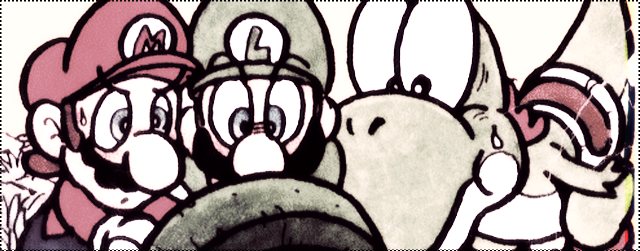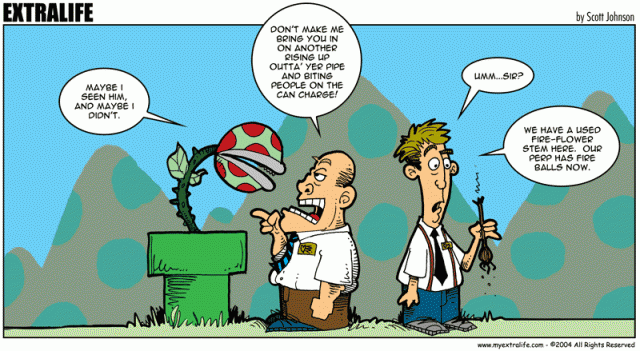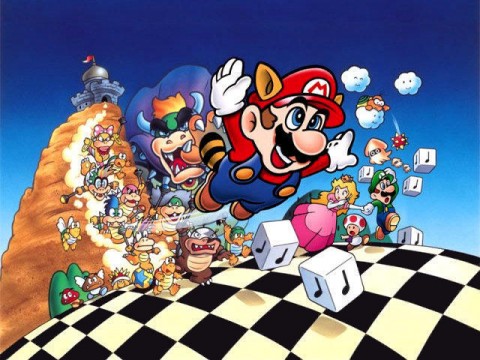
In 2011, thirty years after the birth of Jumpman– thirty, yes, let that sink in a bit– it’s a given that some kind of Mario game will appear on some kind of platform at least once a year. This year alone, Mario will appear in Mario Sports Mix and the 3DS iterations of Mario Kart, Paper Mario and Super Mario Bros. (Let’s also not forget Mario & Sonic at the London 2012 Olympic Games, that cross-company feature which opens a whole new bag of gummy worms we’ll get into later.)
Last year, Mario explored the universe in Super Mario Galaxy 2, fought off miniature clones in Mario vs. Donkey Kong: Mini-Land Mayhem! and returned back to his roots in Super Mario All-Stars 25th Anniversary Edition. There’s no doubt that people who grew up playing Donkey Kong and Mario Bros. in arcades, now perhaps in their thirties or forties, continue to recognize the Mario character as a symbol of quality gaming, even if all this branding is a little bit overkill. Maybe these people even still play Mario games with their kids as the second controller in Super Mario Galaxy, or as Toad in New Super Mario Bros. Wii. For his part, Mario’s still running, jumping and woo-hoo-wa-ha-whee-heeing all over the place– even to the point where he can compete in the Olympics. Not too shabby for a guy who’s old enough to be a senator of the Roman Republic.
But why hasn’t it all gotten old yet?
In his article for Kill Screen, “The Young & The Scoreless,” Ryan Bradley notes that infants are born “handling more raw data than we’ll ever deal with again,” with the raw data being this very world we live in, still a shining promised land to the newborn. So it’s only when we see a superb movie or play a ridiculously good video game, Bradley argues, that we can “glimpse into our own infancy,” running across the Shire or landing on Tallon IV, bracing ourselves for an onslaught of new sights and sounds. It’s only these times that we manage to step out of our jaded old world and into a new one, making a journey even more fantastic than the ones Christopher Columbus or Tenzing Norgay ever made, and regressing– even temporarily!– into childlike wonder.

The Mario mythos has inspired many a fan to take up arms in their own attempts at wonder.
The main Super Mario Bros. games facilitate this especially well, and to a certain extent, so do the spin-offs. Mario & Sonic at the Olympic Games injects its two protagonists– twin totems of innovation and competition in the video game industry– into an already-high-octane competition with high, global stakes, and though the game sort of takes place in the real world, it also sort of doesn’t. Meanwhile, Super Mario World portrays a world that on first glance looks relatively like our own, what with its protagonist being a plumber and the ecosystem involving fungi and flora (and birds, presumably– there are feathers at least), but then turns that whole table upside down, Miyamoto-style. In the Mushroom Kingdom, fungi, flora and feathers of birds give you superpowers, however transient, to be used on giant turtles. Stars, normally gaseous cosmic objects, give you invulnerability. “Look at us!” the power-ups seem to say. “We’re so familiar, but we do such wonderful things!” We look at them, here in the glorious Mushroom Kingdom, and wonder if we could be comforted even more.
Then we see that here, humans co-exist with and even incubate live dinosaurs– among the most popular of childhood fixations. Coincidence? Probably not.
The thing is, it’s hard to come across something wholly new when you’re thirty, much less be amazed by it. Oh, sure, getting a bonus is a nice surprise, but it’s also something that doesn’t necessarily have lasting (or even immediate) financial impact; meanwhile, that lovey-dovey feeling you get when you buy something new only lasts so long. (How long does it take you to take a new game console for granted?) We’re jaded because we’re no longer infants in a brand new world, and we have to turn to other things to avoid a relatively monotonous existence.

Super Mario Bros. 3 remains one of the best-selling games of all time not bundled with a console.
Meanwhile, Mario games like Super Mario Bros. 3 directly combat this. Yes, Mario’s a plumber. Yes, he’s fond of mushrooms. But when Mario gets a promotion and becomes Fire-slash-Tanooki-slash-Et Cetera Mario, there’s an immediate response in the hyper-real abilities he attains, whether it’s shooting fireballs or flying above the clouds. When Mario gets that one hundredth coin, he always gets an extra life– a concept that precludes any possibility of permanently vanishing a la death in the real world. Life in the Mushroom Kingdom, unlike life as an adult in the real world, is couched in comforting, clockwork dependability, as well as instant gratification. Even in Paper Mario, the least clockwork of Mario games simply by virtue of its role-playing genre, money can always be counted on to be hiding somewhere in a bush or, inevitably, on the ground after squashing an enemy’s hit points; obstacles, like the barrels in Donkey Kong, come at a predetermined pace and rhythm that, after some practice, become simple to avoid. From the very beginning, the only road in Mushroom Kingdom is Easy Street, and it’s one we visit again and again because it’s not in our real world.
With innovations like streaming films instantly on Netflix or downloading games from our very homes, or even buying groceries on our phone, we’re getting closer and closer to a level of dependability that the Mushroom Kingdom seems to have had all along. But we’re not quite there yet. Until then, we’ll have to play games like Super Mario World to satiate our innermost needs– and so it looks like our thirty-year-old plumber will be here for many more years to come.




 ShareThis
ShareThis







Super Mario has been there for me ever since I was four, and I sure hope he sticks around for a looong time. :)